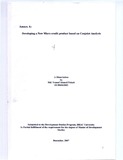| dc.contributor.advisor | Osmani, S.R | |
| dc.contributor.author | Polash, Md. yousuf Ahmed | |
| dc.date.accessioned | 2010-09-26T06:20:20Z | |
| dc.date.available | 2010-09-26T06:20:20Z | |
| dc.date.copyright | 2007 | |
| dc.date.issued | 2007-12 | |
| dc.identifier.other | ID 04162002 | |
| dc.identifier.uri | http://hdl.handle.net/10361/231 | |
| dc.description | This dissertation is submitted in partial fulfillment of the requirements for the degree of Master of Development Studies, 2007. | |
| dc.description | Cataloged from PDF version of dissertation report. | |
| dc.description | Includes bibliographical references (page 112-113). | |
| dc.description.abstract | Presently most of the microfinance providers follow qualitative methods for product development, therefore in most of the cases products were developed without knowing how much utility it is going to provide to a customer. The study tries to develop a microcredit product following quantitative method, namely conjoint analysis and analyzed whether new product provides more utility than the existing one or not. To reach the goal a survey was conducted among the borrowers of Safe Save, a Dhaka based NGO which provides flexible credit to the urban slum dwellers. The survey result depicts huge difference between new product and the Safe Save's product. New product provides more utility than the existing one. | en_US |
| dc.description.statementofresponsibility | Md. Yousuf Ahmed Polasb | |
| dc.format.extent | 121 pages | |
| dc.language.iso | en | en_US |
| dc.publisher | BRAC University | en_US |
| dc.rights | BRAC University dissertation are protected by copyright. They may be viewed from this source for any purpose, but reproduction or distribution in any format is prohibited without written permission. | |
| dc.subject | Developmental studies programs. | |
| dc.title | Developing a new micro credit product based on conjoint analysis | en_US |
| dc.type | Dissertation | en_US |
| dc.contributor.department | BRAC Development Institute, BRAC University | |
| dc.description.degree | M. Development Studies | |

